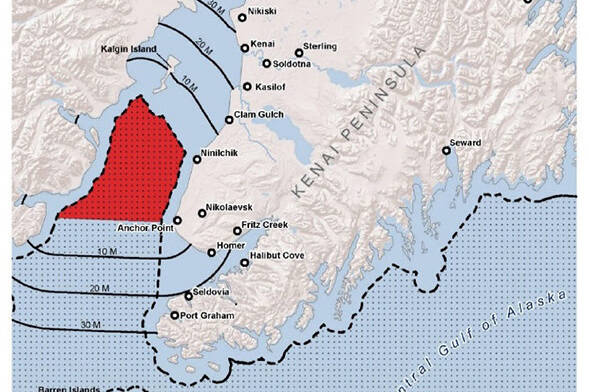Peninsula municipalities are still fighting back against the closure of federal waters in Cook Inlet to commercial salmon fishing. The city councils of both Kenai and Homer have agreed to file amicus briefs in a lawsuit brought forth by the United Cook Inlet Drift Association, which has a goal of reopening the waters before the 2022 summer fishing season.
The waters in question, called the Exclusive Economic Zone (EEZ), run from south of Kalgin Island to about Anchor Point, and are a key fishing ground for many of Cook Inlet’s drift net fleet. The North Pacific Fishery Management Council (NPFMC) voted last December to recommend the closure as a “management” plan — a move that drew swift criticism from multiple peninsula stakeholders, with many citing potential economic harm and the alternative’s late addition to the council process.
Groups across the peninsula, including the cities of Homer and Kenai as well as the Kenai Peninsula Borough, have consistently voiced their opposition to the closure of Cook Inlet’s federal waters to commercial salmon fishing. Both entities passed legislation in March asking U.S. Secretary of Commerce Gina Raimondo to veto the management council’s decision.
“Closing of the fishery in the EEZ does not provide the greatest opportunity for harvest, and while closure does protect salmon, minimize regulatory burden, and avoid additional management jurisdictions, other paths forward could accomplish the same without the potential harm to the fishery participants and communities that rely on and support the fishery,” legislation passed by the Kenai City Council this summer says.
Kenai Attorney Scott Bloom presented the option of continuing to voice the city’s opposition to the closure during the council’s Dec. 15 meeting, such as by filing an amicus curiae brief in the UCIDA suit. That case calls the decision to close the waters “arbitrary, capricious, and contrary” to multiple laws, including the Magnuson-Stevens Act, and cites the “immediate and disastrous consequences” the closure would have on commercial fish processors, their families and the local economy.
Bloom told the council that he would not recommend that the City of Kenai sign onto the UCIDA lawsuit as a party, but rather that it file an amicus brief outlining the city’s “narrow interest” in the issue. The judge hearing the case would then be able to decide whether or not to consider the city’s brief.
Amicus curiae briefs, also called amicus briefs, are frequently submitted by a person or group that is not party to a legal action but has a strong interest in the issue, according to Cornell University’s Legal Information Institute. The phrase “amicus curiae” is Latin for “friend of the court.” Amicus briefs are submitted with the intention of influencing a court’s decision.
Bloom said in response to interest from other municipalities, there may also be an opportunity for Homer, Seward, Kenai and the borough to all sign on to one brief.
Council member Teea Winger said she would support filing a brief during the council’s Dec. 15 meeting, and that standing with other municipalities would carry more weight.
“I think our body has strongly stood on our feet on this issue,” Winger said. “We understand the vital importance of the fishery and, really, the burden it’s going to put on members of our community, both locally as well as neighboring communities.”
Robert Ruffner, the former executive director of the Kenai Watershed Forum who has also served on the Alaska Board of Fisheries, also supported the city taking a stand. Ruffner has previously publicly opposed the closure, which he said has concerned Kenai fish processors who were taken by surprise.
“The fisheries are highly regulated and when they are regulated in a way that takes a bad hop for a local government — the City of Kenai in particular — I do think that the city is positioned and should respond in a manner to try and correct what was really … the wrong way for the federal government to manage the fishery,” Ruffner said.
In its own resolution directing City Attorney Michael Gatti to file an amicus brief in the UCIDA case, the Homer City Council cited the importance of Cook Inlet’s federal waters to Homer’s local history, culture and economy.
“The Homer City Council has consistently advocated for science-based fisheries management decisions that are equitable across fishery users and sustainable for continued human benefit into the future,” the resolution says. “ … Prohibiting commercial salmon fishing in the federal waters of Cook Inlet effectively eliminates the economic vitality of the fishery and viability of local seafood processors.”
That resolution passed unanimously.
A group of three fishermen have also filed suit — separately from UCIDA — in response to the looming closure. They’re being represented pro bono by the Pacific Legal Foundation, a nonprofit legal organization that focuses on cases dealing with what they say is government overreach.
PLF Attorney Michael Poon told the Clarion last month that they will focus on what they say is the unconstitutionality of how members of the North Pacific Fishery Management Council were appointed. Because members of the North Pacific Fishery Management Council were not appointed by the president and confirmed by the Senate, the firm says, it was unconstitutional for them to propose the rule closing the EEZ, and therefore that rule is void.
Bloom told the Kenai City Council during the body’s Dec. 15 meeting that he does not think the PLF lawsuit is one the city “wants to be involved in,” due to the nature of the argument.
“That’s sort of not an argument I think really the city has an interest in,” Bloom said. “That’s sort of a technical legal argument.”
The Kenai City Council’s Dec. 15 meeting can be viewed in full on the city’s YouTube channel.
Reach reporter Ashlyn O’Hara at ashlyn.ohara@peninsulaclarion.com.


